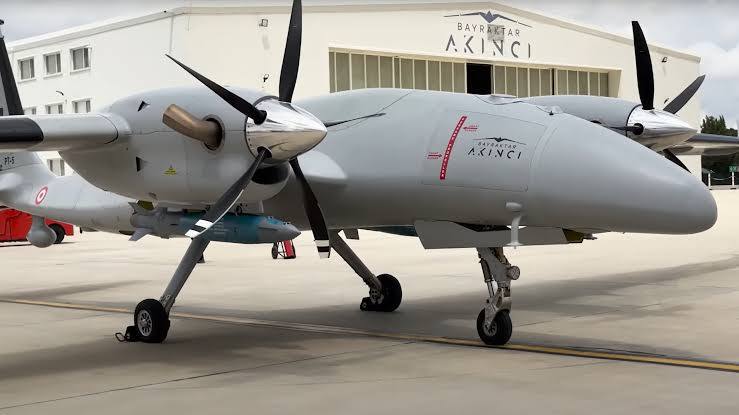Turkey delivered two advanced Bayraktar Akıncı unmanned combat aerial vehicles (UCAVs) to Somalia on Tuesday amid tensions with the US over Ankara’s deepening military, energy and aerospace cooperation with Mogadishu, officials told Middle East Eye (MEE).
Somalia’s newly appointed Minister of Ports and Marine Transport Abdulkadir Mohammed Nur, who previously served as defense minister, announced the delivery in a Facebook post showing the drones arriving on an A400M cargo plane.
“A true brother is revealed in difficult times. Turkey has once again provided unprecedented aid to the Somali people, who are battling against foreign invaders,” Nur wrote.
The Bayraktar Akıncı, developed by Turkish defense contractor Baykar, is a strategic-class combat drone with greater firepower than the TB-2 model that has been widely used in various conflicts. It can fly for over 24 hours with a 6,000-kilometer range and reach an altitude of 30,000 feet.
The UCAV features triple-redundant satellite and line-of-sight communication systems with artificial intelligence for signal processing and situational awareness. It includes automated flight controls and landing systems.
Somalia’s government aims to use these drones against increasing al-Shabab attacks on its forces and infrastructure, allowing for precision strikes and surveillance of militant movements to weaken the group’s capabilities.
The delivery came just days after Somali President Hassan Sheikh Mohamud dismissed Abdulkadir Mohamed Nur as defense minister on Sunday following US military lobbying efforts, sources told Middle East Eye.
Nur was reassigned as ports minister amid signs of slowing US military support for Somalia’s fight against al-Shabab, which Washington designates as a terrorist organization.
Two sources familiar with the situation told MEE that Nur’s work to strengthen Somalia’s military, energy and aerospace cooperation with Turkey troubled Washington, which maintains closer ties with the United Arab Emirates in the Horn of Africa.
Somalia and Turkey signed a comprehensive naval, trade and defense agreement in February 2023 under Nur’s leadership.
Sources say the largely undisclosed deal gives Turkey responsibility for protecting Somali waters, building a Somali navy and supporting energy resource exploration, responding to Ethiopia’s naval agreement with the breakaway region of Somaliland.
Nur, an Ankara University graduate who speaks fluent Turkish, has built strong ties with Turkey’s leadership over years.
A Somali official told MEE that US military officers repeatedly pressured Mohamud to dismiss Nur, citing concerns over his lack of coordination with American forces.
“They also demanded access to the February agreement,” the official said. “These discussions happened multiple times throughout the year as US lobbying efforts intensified.”
The official said Washington was displeased with Turkey’s plans to establish a spaceport in Somalia and potentially launch rockets, which could be perceived as long-range ballistic missile tests.
Ankara’s recent agreements to explore oil and gas resources in Somali territory also concerned US officials, according to the source.
The official and another source told MEE that Turkey’s deployment of two Bayraktar Akıncı armed drones to Mogadishu on Tuesday to combat al-Shabab was the final straw.
“The Americans essentially made clear that if Nur wasn’t removed, they would reconsider their security cooperation with Mogadishu against al-Shabab,” the second source said.
Earlier this month the US Embassy in Mogadishu issued a security warning about a possible al-Shabab attack on the airport and other locations, leading to flight cancellations by Qatar Airways and Turkish Airlines.
Somali Finance Minister Bihi Iman Egeh told parliament the government now needs alternative funding sources for the salaries of Danab, an elite Somali military unit funded by the US.
Ahmed Abdullahi Sheikh, a former Danab commander, supported Mohamud’s decision. “I wholeheartedly welcome the change in leadership,” he said.
A Turkish official downplayed the impact of Nur’s dismissal on Turkish-Somali relations, emphasizing institutional rather than personal connections.
“This will not affect our relationship,” the official said. “All agreements with Mogadishu were signed with the government and the Somali president.”



